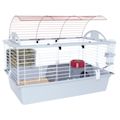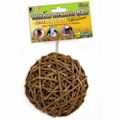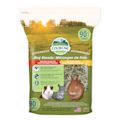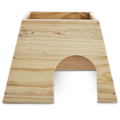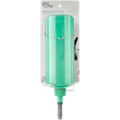Chinchilla Shop
Get It Today
Chinchilla Supplies
Unique pets like chinchillas require things like hideaways, enclosures and toys made just for them. Chinchillas are playful animals, so the chinchilla accessories you buy should reflect that. Fond of chewing, chinchillas need good chew toys like various wood sticks and blocks, willow branch balls, chew rings and salt ropes.
Frequently Asked Questions
-
The chinchilla supplies you’ll need come in a few main categories: food, habitat and play. To keep their well-being top of mind, make sure you have the things you need to help your chinchilla thrive. A water bottle is a must, so they stay hydrated, and you want to look for one with a self-service tube they cannot chew through. A stainless-steel ballpoint tube, for example, will keep them from biting and closing off their water supply. Other chinchilla pet supplies you need include feeders like a hay rack and food bowl, toys for chewing and playing and hideaways for rest—all housed in an enclosure that offers them extra room and space to move.
-
While you can purchase items made for other small animals for your chinchilla, like guinea pig supplies, make sure that the food you get is made for the specific dietary requirements of chinchillas. And your other chinchilla accessories should work well for their habits and preferences as well.
In terms of chinchilla food supplies, a veterinarian can give you a list of items not to feed your chinchilla. As some foods are poisonous to chinchillas, double-check that what you give them does not include toxic foods. Some examples include peanuts, bananas, lettuce, cabbage, corn and more. They can tolerate some limited fruits and vegetables, but high-quality chinchilla pellets or mixes are best.
Because of their propensity for chewing and other similarities, chinchilla and rabbit supplies are often interchangeable, but make sure to read labels and descriptions carefully. The chinchilla pet supplies you find should be made with nontoxic materials designed to withstand chewing. Avoid any toys with small removable pieces that could become choking hazards.
-
Chinchillas are most active in the morning and at night, and their feeding schedule usually reflects this. Though age, lifestyle and health play a role in how to care for your chinchilla, some basic rules for daily care include:
- Feed them twice daily. You can find food blends specifically made for chinchillas. The bulk of their diet consists of wild grasses, leaves, twigs and roots, but always keep supplementary hay available to aid their digestion.
- Their continuously growing teeth need the right foods and chew toys to maintain the correct length and shape. Your collection of chinchilla stuff should always include things to chew.
- Clean water is a must, and drinking bottles designed for chinchillas should be attached at a height they can reach with ease.
- A place to sleep with hideaway spots and a designated bathroom area is essential for the well-being of your chinchilla. Clean their habitat daily and make sure their various zones are tidy.

